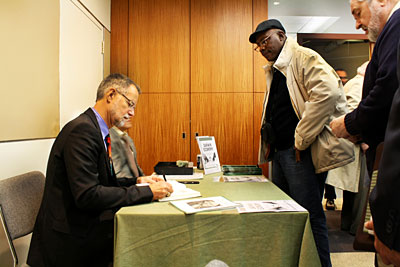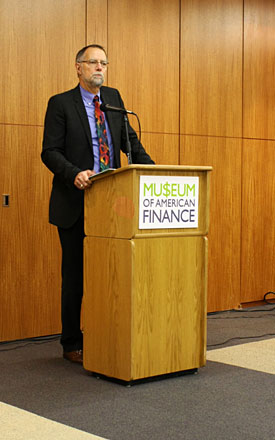Tax spending -- not income -- to save society $3 trillion a year, says Frank in NYC
By Claire Lambrecht


Many politicians want to cut income taxes, but Cornell economist Robert H. Frank wants to eliminate them entirely.
Doing so, and replacing them with a steeply progressive consumption tax, would free up $3 trillion annually, said Frank, author of the new book "The Darwin Economy: Liberty, Competition and the Common Good" (Princeton University Press), speaking to 50 people at a lunchtime lecture at the Museum of American Finance in New York City Nov. 2.
"In the marketplace, the real source of waste is not in the government," said Frank, the Henrietta Johnson Louis Professor of Management at the Samuel Curtis Johnson Graduate School of Management and a regular columnist at The New York Times. "It's in the fact that what I spend to achieve my goals is often offset exactly by what you spend to remain competitive with me," he said.
Whether this competition translates into bidding for property in an expensive neighborhood, gaining admission to a selective university or planning a party, the cost of keeping up with the Joneses continues to rise.
"The person in the middle doesn't have any more income than before to speak of," said Frank, "but they have to buy a house that is much more expensive just to meet the everyday goal of getting their kids into an average-quality school." Some have criticized this kind behavior as irresponsible. Frank, however, is more forgiving. "They're not character flaws, they're not cognitive errors, they're not anything of the sort," he said. "These are just the imperatives of competition."
Just as animals adapt to their environments, as described in Charles Darwin's "The Origin of the Species," humans modify their behavior as context changes. The average wedding, for example, cost $28,000 in 2009, up from $11,000 in 1980.
"Does anyone in the room think that the people who got married in 2009 were happier than the people who got married in 1980?" Frank asked. "No. It's just that there was a cascade there, too. The standard you have to meet to recognize what an important occasion it is escalated as people spent more and more."
In spite of evidence, contextual competition is largely left out of economic models. "Economists will look back in embarrassment someday that we didn't have context built explicitly into our models," said Frank. "It's there in the behavior, whether it's in the models or not."
A steeply progressive consumption tax, Frank said, could allow groups of people to pare back spending and reduce risk without jeopardizing their relative social position. A tax like this might encourage Americans (who according to an October report by the U.S. Department of Commerce save just 3.6 percent of their income) to invest in tax-sheltered accounts what would otherwise have been spent jockeying for position. The key to preventing this wasteful spending is for everyone to step back in tandem. "This tax provides a very powerful incentive for them to do that."
Frank will present a talk on "The Darwin Economy" Nov. 28 at 4:45 p.m. in 233 Plant Science Building.
Claire Lambrecht '06 is a freelance writer in New York City.
Media Contact
Get Cornell news delivered right to your inbox.
Subscribe